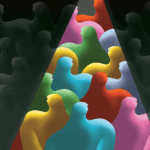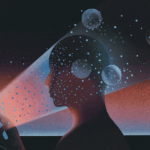Universities are embracing AI: will students get smarter or stop thinking?
Autism is on the rise: what’s really behind the increase?
Nature, 26 Aug 2025
RFK Jr has vowed to find out what’s responsible, but scientists say he is ignoring answers from decades of research.

How to speak to a vaccine sceptic: research reveals what works
Nature, 10 Jun 2025
Hesitancy about vaccinations is on the rise, but studies show there are specific ways to address people's questions.

Exclusive: the most-cited papers of the twenty-first century
Nature, 15 Apr 2025
A Nature analysis reveals the 25 highest-cited papers published this century and explores why they are breaking records.

Do smartphones and social media really harm teens’ mental health?
Nature, 02 Apr 2025
Researchers are debating the strength of evidence connecting technology to surging rates of adolescent mental illness. But they have some clear advice for parents.

How to make better decisions in an age of disinformation
Bloomberg UK, 21 Mar 2025
A new book by an infectious disease epidemiologist shows how proof is more elusive than we realize, whether in law, science, policy or math.
Alcohol and cancer risk: what you need to know
Nature, 11 Mar 2025
Experts weigh in on the risks of moderate drinking — and how people should assess them.

Are the Internet and AI affecting our memory? What the science says
Nature, 05 Feb 2025
Search engines, GPS maps and other tech can alter our ability to learn and remember. Now scientists are working out what AI might do.

Stand up and be counted: six ways to protest that will make your voice heard
The Guardian, 15 Jan 2025
The current wave of marches and activism around the world is the largest in documented history, giving scientists the chance to study what makes for a successful campaign
Science could solve some of the world’s biggest problems. Why aren’t governments using it?
Nature, 04 Dec 2024
A Nature global survey finds that most specialists are unhappy with systems to provide science advice to policymakers.

Can AI review the scientific literature — and figure out what it all means?
Nature, 13 Nov 2024
Artificial intelligence could help speedily summarize research. But it comes with risks.

Scientists are building giant ‘evidence banks’ to create policies that actually work
Nature, 21 Sep 2024
Funders launch projects with US$70 million to develop tools that make rapid syntheses of the world’s science.

The science of protests: how to shape public opinion and swing votes
Nature, 26 Jun 2024
Demonstrations are on the rise, and scientists are revealing which types work best.

Autism is on the rise: what’s really behind the increase?
Autism is on the rise: what’s really behind the increase?
Nature, 26 Aug 2025
RFK Jr has vowed to find out what’s responsible, but scientists say he is ignoring answers from decades of research.

How to speak to a vaccine sceptic: research reveals what works
Nature, 10 Jun 2025
Hesitancy about vaccinations is on the rise, but studies show there are specific ways to address people's questions.

Exclusive: the most-cited papers of the twenty-first century
Nature, 15 Apr 2025
A Nature analysis reveals the 25 highest-cited papers published this century and explores why they are breaking records.

Do smartphones and social media really harm teens’ mental health?
Nature, 02 Apr 2025
Researchers are debating the strength of evidence connecting technology to surging rates of adolescent mental illness. But they have some clear advice for parents.

How to make better decisions in an age of disinformation
Bloomberg UK, 21 Mar 2025
A new book by an infectious disease epidemiologist shows how proof is more elusive than we realize, whether in law, science, policy or math.
Alcohol and cancer risk: what you need to know
Nature, 11 Mar 2025
Experts weigh in on the risks of moderate drinking — and how people should assess them.

Are the Internet and AI affecting our memory? What the science says
Nature, 05 Feb 2025
Search engines, GPS maps and other tech can alter our ability to learn and remember. Now scientists are working out what AI might do.

Stand up and be counted: six ways to protest that will make your voice heard
The Guardian, 15 Jan 2025
The current wave of marches and activism around the world is the largest in documented history, giving scientists the chance to study what makes for a successful campaign
Science could solve some of the world’s biggest problems. Why aren’t governments using it?
Nature, 04 Dec 2024
A Nature global survey finds that most specialists are unhappy with systems to provide science advice to policymakers.

Can AI review the scientific literature — and figure out what it all means?
Nature, 13 Nov 2024
Artificial intelligence could help speedily summarize research. But it comes with risks.

Scientists are building giant ‘evidence banks’ to create policies that actually work
Nature, 21 Sep 2024
Funders launch projects with US$70 million to develop tools that make rapid syntheses of the world’s science.

The science of protests: how to shape public opinion and swing votes
Nature, 26 Jun 2024
Demonstrations are on the rise, and scientists are revealing which types work best.

How to speak to a vaccine sceptic: research reveals what works
Autism is on the rise: what’s really behind the increase?
Nature, 26 Aug 2025
RFK Jr has vowed to find out what’s responsible, but scientists say he is ignoring answers from decades of research.

How to speak to a vaccine sceptic: research reveals what works
Nature, 10 Jun 2025
Hesitancy about vaccinations is on the rise, but studies show there are specific ways to address people's questions.

Exclusive: the most-cited papers of the twenty-first century
Nature, 15 Apr 2025
A Nature analysis reveals the 25 highest-cited papers published this century and explores why they are breaking records.

Do smartphones and social media really harm teens’ mental health?
Nature, 02 Apr 2025
Researchers are debating the strength of evidence connecting technology to surging rates of adolescent mental illness. But they have some clear advice for parents.

How to make better decisions in an age of disinformation
Bloomberg UK, 21 Mar 2025
A new book by an infectious disease epidemiologist shows how proof is more elusive than we realize, whether in law, science, policy or math.
Alcohol and cancer risk: what you need to know
Nature, 11 Mar 2025
Experts weigh in on the risks of moderate drinking — and how people should assess them.

Are the Internet and AI affecting our memory? What the science says
Nature, 05 Feb 2025
Search engines, GPS maps and other tech can alter our ability to learn and remember. Now scientists are working out what AI might do.

Stand up and be counted: six ways to protest that will make your voice heard
The Guardian, 15 Jan 2025
The current wave of marches and activism around the world is the largest in documented history, giving scientists the chance to study what makes for a successful campaign
Science could solve some of the world’s biggest problems. Why aren’t governments using it?
Nature, 04 Dec 2024
A Nature global survey finds that most specialists are unhappy with systems to provide science advice to policymakers.

Can AI review the scientific literature — and figure out what it all means?
Nature, 13 Nov 2024
Artificial intelligence could help speedily summarize research. But it comes with risks.

Scientists are building giant ‘evidence banks’ to create policies that actually work
Nature, 21 Sep 2024
Funders launch projects with US$70 million to develop tools that make rapid syntheses of the world’s science.

The science of protests: how to shape public opinion and swing votes
Nature, 26 Jun 2024
Demonstrations are on the rise, and scientists are revealing which types work best.

Exclusive: the most-cited papers of the twenty-first century
Autism is on the rise: what’s really behind the increase?
Nature, 26 Aug 2025
RFK Jr has vowed to find out what’s responsible, but scientists say he is ignoring answers from decades of research.

How to speak to a vaccine sceptic: research reveals what works
Nature, 10 Jun 2025
Hesitancy about vaccinations is on the rise, but studies show there are specific ways to address people's questions.

Exclusive: the most-cited papers of the twenty-first century
Nature, 15 Apr 2025
A Nature analysis reveals the 25 highest-cited papers published this century and explores why they are breaking records.

Do smartphones and social media really harm teens’ mental health?
Nature, 02 Apr 2025
Researchers are debating the strength of evidence connecting technology to surging rates of adolescent mental illness. But they have some clear advice for parents.

How to make better decisions in an age of disinformation
Bloomberg UK, 21 Mar 2025
A new book by an infectious disease epidemiologist shows how proof is more elusive than we realize, whether in law, science, policy or math.
Alcohol and cancer risk: what you need to know
Nature, 11 Mar 2025
Experts weigh in on the risks of moderate drinking — and how people should assess them.

Are the Internet and AI affecting our memory? What the science says
Nature, 05 Feb 2025
Search engines, GPS maps and other tech can alter our ability to learn and remember. Now scientists are working out what AI might do.

Stand up and be counted: six ways to protest that will make your voice heard
The Guardian, 15 Jan 2025
The current wave of marches and activism around the world is the largest in documented history, giving scientists the chance to study what makes for a successful campaign
Science could solve some of the world’s biggest problems. Why aren’t governments using it?
Nature, 04 Dec 2024
A Nature global survey finds that most specialists are unhappy with systems to provide science advice to policymakers.

Can AI review the scientific literature — and figure out what it all means?
Nature, 13 Nov 2024
Artificial intelligence could help speedily summarize research. But it comes with risks.

Scientists are building giant ‘evidence banks’ to create policies that actually work
Nature, 21 Sep 2024
Funders launch projects with US$70 million to develop tools that make rapid syntheses of the world’s science.

The science of protests: how to shape public opinion and swing votes
Nature, 26 Jun 2024
Demonstrations are on the rise, and scientists are revealing which types work best.

Do smartphones and social media really harm teens’ mental health?
Autism is on the rise: what’s really behind the increase?
Nature, 26 Aug 2025
RFK Jr has vowed to find out what’s responsible, but scientists say he is ignoring answers from decades of research.

How to speak to a vaccine sceptic: research reveals what works
Nature, 10 Jun 2025
Hesitancy about vaccinations is on the rise, but studies show there are specific ways to address people's questions.

Exclusive: the most-cited papers of the twenty-first century
Nature, 15 Apr 2025
A Nature analysis reveals the 25 highest-cited papers published this century and explores why they are breaking records.

Do smartphones and social media really harm teens’ mental health?
Nature, 02 Apr 2025
Researchers are debating the strength of evidence connecting technology to surging rates of adolescent mental illness. But they have some clear advice for parents.

How to make better decisions in an age of disinformation
Bloomberg UK, 21 Mar 2025
A new book by an infectious disease epidemiologist shows how proof is more elusive than we realize, whether in law, science, policy or math.
Alcohol and cancer risk: what you need to know
Nature, 11 Mar 2025
Experts weigh in on the risks of moderate drinking — and how people should assess them.

Are the Internet and AI affecting our memory? What the science says
Nature, 05 Feb 2025
Search engines, GPS maps and other tech can alter our ability to learn and remember. Now scientists are working out what AI might do.

Stand up and be counted: six ways to protest that will make your voice heard
The Guardian, 15 Jan 2025
The current wave of marches and activism around the world is the largest in documented history, giving scientists the chance to study what makes for a successful campaign
Science could solve some of the world’s biggest problems. Why aren’t governments using it?
Nature, 04 Dec 2024
A Nature global survey finds that most specialists are unhappy with systems to provide science advice to policymakers.

Can AI review the scientific literature — and figure out what it all means?
Nature, 13 Nov 2024
Artificial intelligence could help speedily summarize research. But it comes with risks.

Scientists are building giant ‘evidence banks’ to create policies that actually work
Nature, 21 Sep 2024
Funders launch projects with US$70 million to develop tools that make rapid syntheses of the world’s science.

The science of protests: how to shape public opinion and swing votes
Nature, 26 Jun 2024
Demonstrations are on the rise, and scientists are revealing which types work best.

How to make better decisions in an age of disinformation
Autism is on the rise: what’s really behind the increase?
Nature, 26 Aug 2025
RFK Jr has vowed to find out what’s responsible, but scientists say he is ignoring answers from decades of research.

How to speak to a vaccine sceptic: research reveals what works
Nature, 10 Jun 2025
Hesitancy about vaccinations is on the rise, but studies show there are specific ways to address people's questions.

Exclusive: the most-cited papers of the twenty-first century
Nature, 15 Apr 2025
A Nature analysis reveals the 25 highest-cited papers published this century and explores why they are breaking records.

Do smartphones and social media really harm teens’ mental health?
Nature, 02 Apr 2025
Researchers are debating the strength of evidence connecting technology to surging rates of adolescent mental illness. But they have some clear advice for parents.

How to make better decisions in an age of disinformation
Bloomberg UK, 21 Mar 2025
A new book by an infectious disease epidemiologist shows how proof is more elusive than we realize, whether in law, science, policy or math.
Alcohol and cancer risk: what you need to know
Nature, 11 Mar 2025
Experts weigh in on the risks of moderate drinking — and how people should assess them.

Are the Internet and AI affecting our memory? What the science says
Nature, 05 Feb 2025
Search engines, GPS maps and other tech can alter our ability to learn and remember. Now scientists are working out what AI might do.

Stand up and be counted: six ways to protest that will make your voice heard
The Guardian, 15 Jan 2025
The current wave of marches and activism around the world is the largest in documented history, giving scientists the chance to study what makes for a successful campaign
Science could solve some of the world’s biggest problems. Why aren’t governments using it?
Nature, 04 Dec 2024
A Nature global survey finds that most specialists are unhappy with systems to provide science advice to policymakers.

Can AI review the scientific literature — and figure out what it all means?
Nature, 13 Nov 2024
Artificial intelligence could help speedily summarize research. But it comes with risks.

Scientists are building giant ‘evidence banks’ to create policies that actually work
Nature, 21 Sep 2024
Funders launch projects with US$70 million to develop tools that make rapid syntheses of the world’s science.

The science of protests: how to shape public opinion and swing votes
Nature, 26 Jun 2024
Demonstrations are on the rise, and scientists are revealing which types work best.

Alcohol and cancer risk: what you need to know
Autism is on the rise: what’s really behind the increase?
Nature, 26 Aug 2025
RFK Jr has vowed to find out what’s responsible, but scientists say he is ignoring answers from decades of research.

How to speak to a vaccine sceptic: research reveals what works
Nature, 10 Jun 2025
Hesitancy about vaccinations is on the rise, but studies show there are specific ways to address people's questions.

Exclusive: the most-cited papers of the twenty-first century
Nature, 15 Apr 2025
A Nature analysis reveals the 25 highest-cited papers published this century and explores why they are breaking records.

Do smartphones and social media really harm teens’ mental health?
Nature, 02 Apr 2025
Researchers are debating the strength of evidence connecting technology to surging rates of adolescent mental illness. But they have some clear advice for parents.

How to make better decisions in an age of disinformation
Bloomberg UK, 21 Mar 2025
A new book by an infectious disease epidemiologist shows how proof is more elusive than we realize, whether in law, science, policy or math.
Alcohol and cancer risk: what you need to know
Nature, 11 Mar 2025
Experts weigh in on the risks of moderate drinking — and how people should assess them.

Are the Internet and AI affecting our memory? What the science says
Nature, 05 Feb 2025
Search engines, GPS maps and other tech can alter our ability to learn and remember. Now scientists are working out what AI might do.

Stand up and be counted: six ways to protest that will make your voice heard
The Guardian, 15 Jan 2025
The current wave of marches and activism around the world is the largest in documented history, giving scientists the chance to study what makes for a successful campaign
Science could solve some of the world’s biggest problems. Why aren’t governments using it?
Nature, 04 Dec 2024
A Nature global survey finds that most specialists are unhappy with systems to provide science advice to policymakers.

Can AI review the scientific literature — and figure out what it all means?
Nature, 13 Nov 2024
Artificial intelligence could help speedily summarize research. But it comes with risks.

Scientists are building giant ‘evidence banks’ to create policies that actually work
Nature, 21 Sep 2024
Funders launch projects with US$70 million to develop tools that make rapid syntheses of the world’s science.

The science of protests: how to shape public opinion and swing votes
Nature, 26 Jun 2024
Demonstrations are on the rise, and scientists are revealing which types work best.

Are the Internet and AI affecting our memory? What the science says
Autism is on the rise: what’s really behind the increase?
Nature, 26 Aug 2025
RFK Jr has vowed to find out what’s responsible, but scientists say he is ignoring answers from decades of research.

How to speak to a vaccine sceptic: research reveals what works
Nature, 10 Jun 2025
Hesitancy about vaccinations is on the rise, but studies show there are specific ways to address people's questions.

Exclusive: the most-cited papers of the twenty-first century
Nature, 15 Apr 2025
A Nature analysis reveals the 25 highest-cited papers published this century and explores why they are breaking records.

Do smartphones and social media really harm teens’ mental health?
Nature, 02 Apr 2025
Researchers are debating the strength of evidence connecting technology to surging rates of adolescent mental illness. But they have some clear advice for parents.

How to make better decisions in an age of disinformation
Bloomberg UK, 21 Mar 2025
A new book by an infectious disease epidemiologist shows how proof is more elusive than we realize, whether in law, science, policy or math.
Alcohol and cancer risk: what you need to know
Nature, 11 Mar 2025
Experts weigh in on the risks of moderate drinking — and how people should assess them.

Are the Internet and AI affecting our memory? What the science says
Nature, 05 Feb 2025
Search engines, GPS maps and other tech can alter our ability to learn and remember. Now scientists are working out what AI might do.

Stand up and be counted: six ways to protest that will make your voice heard
The Guardian, 15 Jan 2025
The current wave of marches and activism around the world is the largest in documented history, giving scientists the chance to study what makes for a successful campaign
Science could solve some of the world’s biggest problems. Why aren’t governments using it?
Nature, 04 Dec 2024
A Nature global survey finds that most specialists are unhappy with systems to provide science advice to policymakers.

Can AI review the scientific literature — and figure out what it all means?
Nature, 13 Nov 2024
Artificial intelligence could help speedily summarize research. But it comes with risks.

Scientists are building giant ‘evidence banks’ to create policies that actually work
Nature, 21 Sep 2024
Funders launch projects with US$70 million to develop tools that make rapid syntheses of the world’s science.

The science of protests: how to shape public opinion and swing votes
Nature, 26 Jun 2024
Demonstrations are on the rise, and scientists are revealing which types work best.

Stand up and be counted: six ways to protest that will make your voice heard
Autism is on the rise: what’s really behind the increase?
Nature, 26 Aug 2025
RFK Jr has vowed to find out what’s responsible, but scientists say he is ignoring answers from decades of research.

How to speak to a vaccine sceptic: research reveals what works
Nature, 10 Jun 2025
Hesitancy about vaccinations is on the rise, but studies show there are specific ways to address people's questions.

Exclusive: the most-cited papers of the twenty-first century
Nature, 15 Apr 2025
A Nature analysis reveals the 25 highest-cited papers published this century and explores why they are breaking records.

Do smartphones and social media really harm teens’ mental health?
Nature, 02 Apr 2025
Researchers are debating the strength of evidence connecting technology to surging rates of adolescent mental illness. But they have some clear advice for parents.

How to make better decisions in an age of disinformation
Bloomberg UK, 21 Mar 2025
A new book by an infectious disease epidemiologist shows how proof is more elusive than we realize, whether in law, science, policy or math.
Alcohol and cancer risk: what you need to know
Nature, 11 Mar 2025
Experts weigh in on the risks of moderate drinking — and how people should assess them.

Are the Internet and AI affecting our memory? What the science says
Nature, 05 Feb 2025
Search engines, GPS maps and other tech can alter our ability to learn and remember. Now scientists are working out what AI might do.

Stand up and be counted: six ways to protest that will make your voice heard
The Guardian, 15 Jan 2025
The current wave of marches and activism around the world is the largest in documented history, giving scientists the chance to study what makes for a successful campaign
Science could solve some of the world’s biggest problems. Why aren’t governments using it?
Nature, 04 Dec 2024
A Nature global survey finds that most specialists are unhappy with systems to provide science advice to policymakers.

Can AI review the scientific literature — and figure out what it all means?
Nature, 13 Nov 2024
Artificial intelligence could help speedily summarize research. But it comes with risks.

Scientists are building giant ‘evidence banks’ to create policies that actually work
Nature, 21 Sep 2024
Funders launch projects with US$70 million to develop tools that make rapid syntheses of the world’s science.

The science of protests: how to shape public opinion and swing votes
Nature, 26 Jun 2024
Demonstrations are on the rise, and scientists are revealing which types work best.

Science could solve some of the world’s biggest problems. Why aren’t governments using it?
Autism is on the rise: what’s really behind the increase?
Nature, 26 Aug 2025
RFK Jr has vowed to find out what’s responsible, but scientists say he is ignoring answers from decades of research.

How to speak to a vaccine sceptic: research reveals what works
Nature, 10 Jun 2025
Hesitancy about vaccinations is on the rise, but studies show there are specific ways to address people's questions.

Exclusive: the most-cited papers of the twenty-first century
Nature, 15 Apr 2025
A Nature analysis reveals the 25 highest-cited papers published this century and explores why they are breaking records.

Do smartphones and social media really harm teens’ mental health?
Nature, 02 Apr 2025
Researchers are debating the strength of evidence connecting technology to surging rates of adolescent mental illness. But they have some clear advice for parents.

How to make better decisions in an age of disinformation
Bloomberg UK, 21 Mar 2025
A new book by an infectious disease epidemiologist shows how proof is more elusive than we realize, whether in law, science, policy or math.
Alcohol and cancer risk: what you need to know
Nature, 11 Mar 2025
Experts weigh in on the risks of moderate drinking — and how people should assess them.

Are the Internet and AI affecting our memory? What the science says
Nature, 05 Feb 2025
Search engines, GPS maps and other tech can alter our ability to learn and remember. Now scientists are working out what AI might do.

Stand up and be counted: six ways to protest that will make your voice heard
The Guardian, 15 Jan 2025
The current wave of marches and activism around the world is the largest in documented history, giving scientists the chance to study what makes for a successful campaign
Science could solve some of the world’s biggest problems. Why aren’t governments using it?
Nature, 04 Dec 2024
A Nature global survey finds that most specialists are unhappy with systems to provide science advice to policymakers.

Can AI review the scientific literature — and figure out what it all means?
Nature, 13 Nov 2024
Artificial intelligence could help speedily summarize research. But it comes with risks.

Scientists are building giant ‘evidence banks’ to create policies that actually work
Nature, 21 Sep 2024
Funders launch projects with US$70 million to develop tools that make rapid syntheses of the world’s science.

The science of protests: how to shape public opinion and swing votes
Nature, 26 Jun 2024
Demonstrations are on the rise, and scientists are revealing which types work best.
